Saleh Malas | Mamoun al-Bustani | Lujain Mourad | Diana Rahima
Drafting a constitution and approving it by a ruling authority within a certain territory, whatever its name, and promoting it as a “Social Contract” aims to regulate the relationship between the components of society and the authority in the lands it controls.
But when the Genevan philosopher Jean-Jacques Rousseau set his ‘Social Contract’ theory, he made it for inspiring political and social reforms or even setting principles of political rights, and not to be used as a ‘facade.’
Drafting a substate constitution in a society that suffers political partition within a non-international armed conflict, such as the Syrian society, can be more than just rules regulating the structure of the de-facto authorities, which were formed as a result of violent military operations.
Rather, it can be described as an opportunity to build a shared sense of responsibility towards conducting people’s needs and resolving their differences within areas outside the control of the Syrian regime.
For seven years, the US-backed Syrian Democratic Forces (SDF) have exercised their effective authority over northeastern Syria by practicing the autonomous federal system as a civilian model to oversee the region with its various institutions. It has established councils that simulate ministries, judicial courts, police, and security forces.
Last February, the expanded committee for drafting the Social Contract Charter concluded its work in the city of Raqqa by focusing on amending the Charter as an attempt to approach a “common, participatory vision” that brings together the components of society in northeastern Syria.
However, such endeavors and the prior attempts since 2014 to amend the “Social Contract” have always been booed with criticism from political parties in the region and international human rights organizations.
In this lengthy article, Enab Baladi highlights the Autonomous Administration’s attempt to build a substate constitution for its military-controlled areas, the legal feasibility of this constitution, its effectiveness in improving the living and security situation in the region, and the usefulness of the amendments made in response to fears of consolidating the authority of the Kurds accused of canceling the rest of the society components and depriving them of their rights to actual participation in decision-making and self-determination.
The ‘Autonomous Administration’ seeks through the ‘constitution’ to impart an international recognition and take a place as an actor in the political tracks related to the Syrian affairs, most notably the negotiations of the Syrian Constitutional Committee.
Constitution apathy
What rights do people need?
The Social Contract is not among the main priorities of Raqqa’s people, as part of an opinion poll conducted by Enab Baladi about the residents’ expectations that the amendment of the “charter” will meet their basic needs.
The priorities of residents in the first place are to reduce the deterioration of their precarious living conditions, which the Autonomous Administration has not addressed so far, and some people showed their indifference to drafting a ‘constitution’ in their city, considering what is happening as mere formalities.
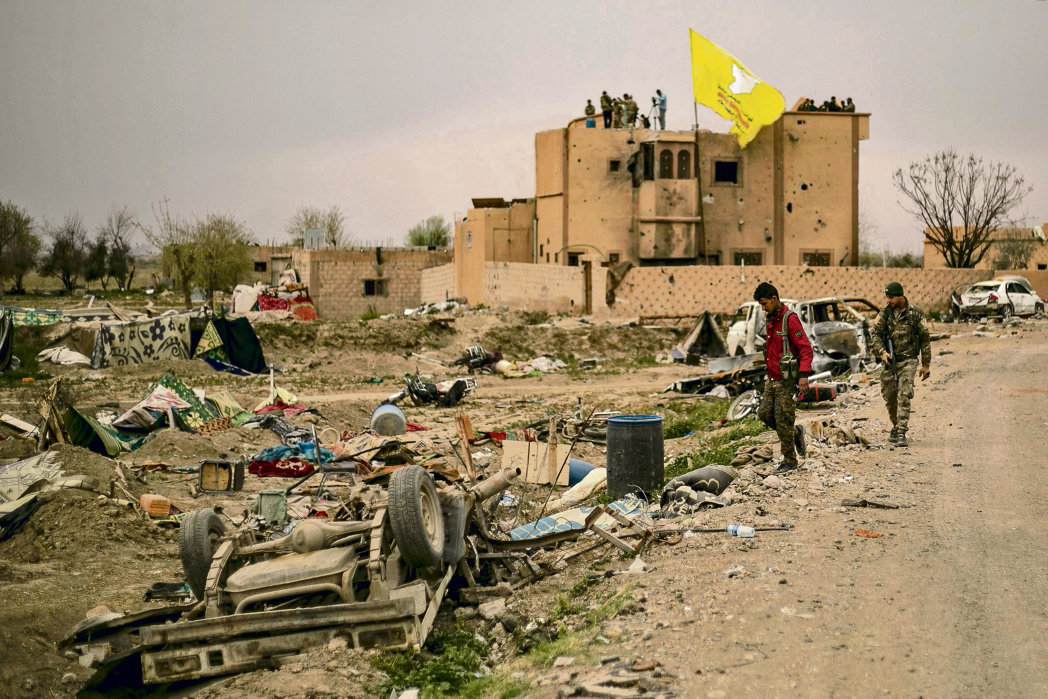
Fighters of the Syrian Democratic Forces (SDF) walk in the town of al-Baghouz in eastern Deir Ezzor governorate – 21 March 2019 (AFP-Delil Souleiman)
The rights that the “social contract” must guarantee in principle, according to Louay, 37, are the rights of labor, the poor, and the needy, equal rights for all people regardless of their political affiliation or social background.
“The people of Raqqa city are not interested in the new amendments to the constitution,” says Louay, Enab Baladi withheld full name for security reasons.
Louay works in a mobile phone shop for a monthly salary of 450,000 SYP (about 180 USD). His first concern is how the self-administration could provide the basic needs and foodstuffs of families in the city due to fears of unavailability.
According to the assessment of the humanitarian initiative (REACH) in a report issued on 5 February, 80 percent of families in northeastern Syria depend for their material income on daily wages, and 92 percent of families suffer from unemployment, which represents a direct obstacle to their access to secure basic needs of food.
The report specified that 79 percent of families consider the high prices in stores and ‘consumer institutions’ to be a common challenge in ensuring food security.
For budget, services must be first
Combating terrorism in the eastern Euphrates region is one of the most important outstanding issues in the Kurdish-controlled territories, especially with the increase in the activity of the Islamic State (IS) sleeper cells, in addition to factors that complicate this issue, including tribalism, the security and service conditions, and other remnants of the conflict over the social situation.
However, the necessity of reducing the security and military role in the region, and directing expenditures from the military sector towards improving the living and social situation of the people, was a demand of all in general.
According to a study on the political economy of the Autonomous Administration of North and East Syria (AANES), prepared by the Syrian researcher Sinan Hatahet, issued in 2020, the data on the budget revenues of the “Self-Administration” is absent, and it is difficult to track how they are collected and spent, given the lack of transparency on this issue.
The terms of the “social contract” are mainly influenced by the concept of autonomous decentralization, and although “self-management” promotes this concept socially and politically, it maintains a great deal of control over key economic sectors.
Under the concept of decentralization, according to Hatahet, private ownership must be transformed into a social and cooperative economy, but the number of commercial cooperative institutions established is few, and their impact remains small and marginal, while local businessmen have become a pillar of the new economic system in the region.
The finances of the Self-Administration are closely intertwined with the rest of the Syrian regions, as the “Administration” has failed to establish an independent community economy as stipulated by the “Social Contract,” and it exercises extensive control over vital economic sectors, which leads the majority of the population within its regions to feel that they are separated and deprived of any meaningful contribution to decision-making or accountability, according to the study.
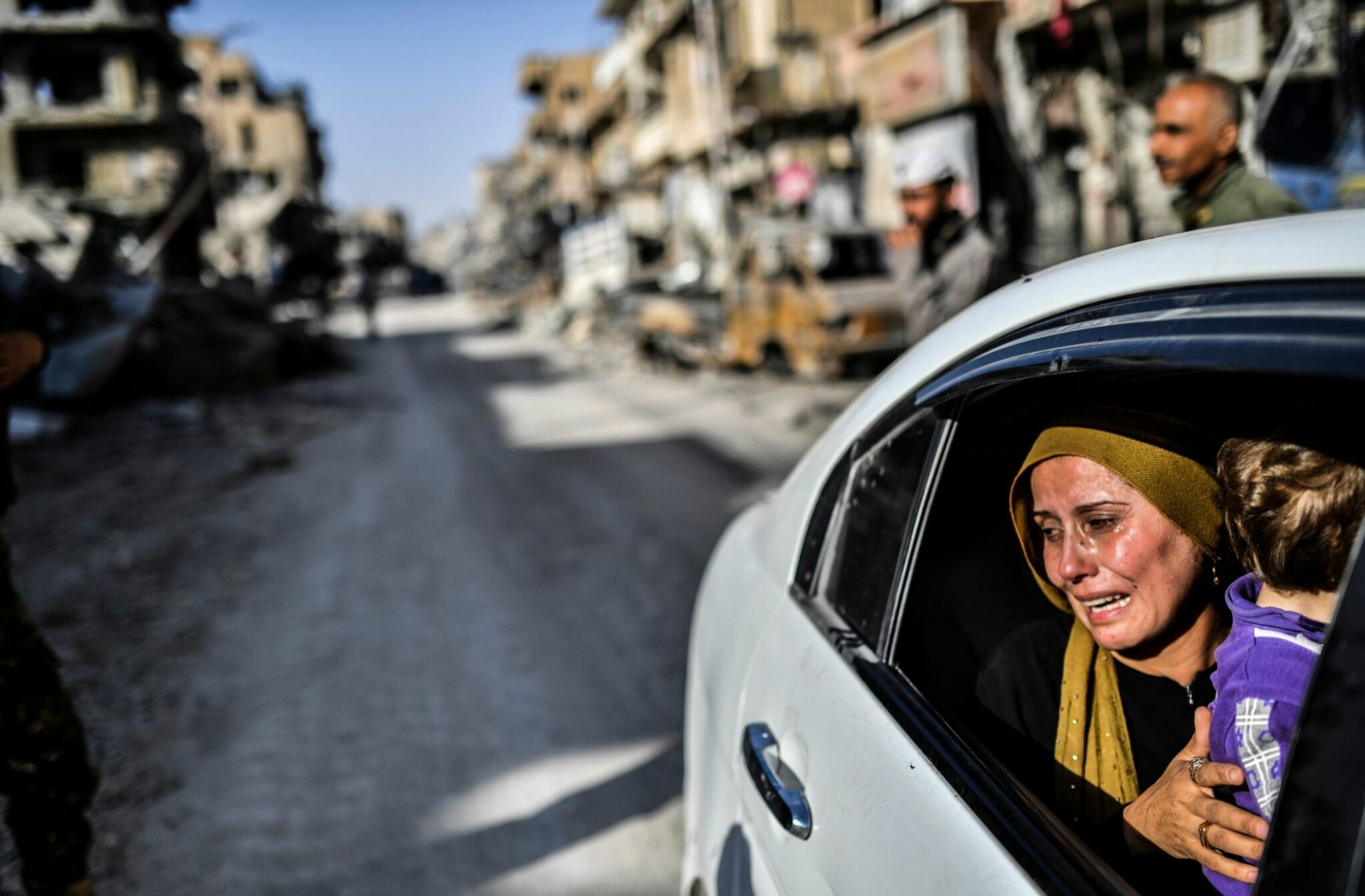
A woman cries as she looks at her house in Raqqa after a Kurdish-led force expelled the Islamic State group from the northern Syrian city in 2017 (AFP)
Equation in components representation
The Autonomous Administration oversees the policies of northeastern Syria, while the “communes,” from the municipalities to the “cantons,” runs the daily policies and practices in the local community, and these “communes,” in principle, have the right to implement their own decisions and policies in economic, social, cultural, and political affairs.
The responsibility of the “communes” includes services such as urban planning, the establishment and management of economic cooperatives, and the distribution of land.
According to the “Social Contract,” the “administration” structure consists of an executive council, a legislative council, a judicial council, a high electoral commission, a supreme constitutional court, and local councils.
At the central level, the Executive Council issues and implements unified policies in consultation with local administrations, including unifying customs fees, fuel prices, travel licenses, labor laws, and judicial amendments.
The Executive Council also controls a number of technical offices that are under its direct supervision, such as the Oil and Underground Resources Office, which is responsible for following up on the work of oil and gas fields, distributing their revenues, managing the electricity network, water distribution, the Office of Development and Planning, which sets urban plans for cities and regions, and the Office of Humanitarian Affairs, which is concerned with issuing licenses to organizations operating in the areas under Self-Administration areas and monitoring and evaluating its work.
The control of the Kurdistan Democratic Union Party (PYD), to which the autonomous Administration’s structure belongs, is still evident in its governance and economic management tools, as the security forces and supporters of the “Democratic Union” lead the local executive and organizational structures. These practices constitute an obstacle to forming reliable decentralization as stipulated in the “social contract.”
The Democratic Union was established as a branch of the Kurdistan Workers Party (PKK) in Syria in 2003 and calls for democratic autonomy.
“The self-administration relies in its ruling on partisan and ideological discrimination, as it places the security grip and politics in the hands of the (PKK) elements, and this is reflected on the street and shows a societal rejection by the Kurds and Arabs in the region,” according to what the researcher in Kurdish affairs, Badr Mulla Rashid, told Enab Baladi.
The researcher considered that the objection in the region in the first place lies in the management of people from outside the region and its society for the entire region.
According to a study by the Omran Center for Strategic Studies, the “Kurdish administration” pursued a policy that transcends the boundaries of nationalities and religions, during which it adopted the theory of the “democratic nation” belonging to the leader of the Kurdistan Workers’ Party, Abdullah Öcalan.
Building a charter by the Autonomous Administration, which seeks to form a political umbrella that would enable it to obtain “legitimacy,” is accompanied by a set of problems, most notably its attempts to obtain societal acceptance in different regions with their human, ethnic, cultural, and religious diversity, and political recognition by the parties to the conflict in Syria.
The possibility of changing the reality of “self-administration” in the region requires real transparency, accountability, and a real judiciary, according to the researcher, considering these features far from the current scene of the region, even after amending the wording of the “social contract.”
The researcher believes that the feasibility of the “Charter” is mainly related to the extent of the self-administration’s commitment to implementing its laws if it is able to reach satisfactory laws locally and internationally.
What are “Communes” and “Cantons”?These two terms are adopted by self-government administrations Communes: A society in which a group of individuals lives together, have close interests, such as language and religion, share ownership, resources, wealth, and responsibilities. This sharing organizes a collective economy to develop the level of development and production capacity. They are often rearranged, merged, or divided by demographic change over time. A commune is governed by a local council. Cantons: Unlike Communes, they remain unchanged since their founding. They are administrative partition within federal government systems, with a small area where each canton has its own independent constitution and independent executive, legislative, and judicial powers, i.e., A system of a self-contained state, but in union with a number of other cantons. |
Poll
Enab Baladi, in an opinion poll on its social media platforms and website, surveyed whether the Charter meets the basic needs of the people in northeastern Syria.
At least 77 percent of the respondents believe that the existence of the Charter did not meet the aspirations of the society components in the region, while 23 percent of the respondents believe that there is a possibility that the provisions of the Charter will meet the basic needs of the people.
Eight years on Social Contract
More paraphrases, criticisms
The drafting of the Social Contract in the autonomous administration areas since 2014 has gone through several stages, and at each stage were criticisms and objections, so the processes of reformulating and making amendments to the “Charter” continued about eight years ago.
The Social Contract Charter, according to the Self-Administration, is defined as a set of laws, organizational rules, and administrative references which institutions must follow in dealings with the inhabitants so that the “Contract” defines the relationship between the individual and the official.
The “Charter, which is currently in force, is the result of consensus between the Kurdish parties in the region, and a form of agreement on managing the areas, after the Syrian regime’s withdrawal in 2012.
In June 2021, the “Self-Administration” announced the formation of a committee to reformulate the Social Contract Charter, consisting of 157 members. Later, the Self-Administration reduced the number to 30.
This initiative came amid criticism directed against the Social Contract, which was hastily written when it was first issued, and did not participate in its drafting by representatives from all regions.
It also neglected several basic human rights principles, such as the prohibition of arbitrary detention, the right to judicial review without delay, and the right to hire a lawyer during criminal proceedings, according to a report by Human Rights Watch, in addition to several basic problems within the preamble of the Charter.
The Kurdish Hawar News Agency reported on 16 February that the Autonomous Administration is moving towards approving the Social Contract’ as a constitution, whose 93 articles written in the draft that is still being drafted, authorize it to play a major role in the transformation of democracy in Syria and the Middle East, through a democratic system that meets the aspirations of the components, and resolves outstanding issues.
The Hawar agency revealed that despite implementing the Social Contract in northeastern Syria, the Autonomous Administration is currently looking at amending its wording and approving it again for all its regions.
The Administration justified the need to amend and reformulate the Social Contract with the expansion of the areas controlled by the SDF after the withdrawal of the Islamic State and “the desire of the people of the liberated areas to follow the model of the Autonomous Administration in the three cantons, and with the increase in civil councils and administrations in this geography,” especially after the Syrian Democratic Council (SDC), the political umbrella of the SDF, held a series of extensive public meetings in northeastern Syria, according to Hawar agency.
The Hawar report indicated that the need to reformulate the Social Contract was one of the most important outcomes of the National Conference of the People of the Jazira and Euphrates, which was held by SDC on 25 November 2020, after it had finished its dialogue workshops and extended meetings at home and abroad, with representatives of the SDF, political parties, independent personalities, tribal leaders, and notables.
While implementing the conference outcomes, the General Council in the Administration decided to reformulate the Social Contract. The Council formed a mini-committee of 30 people, in its meeting held on 15 July 2021, to reformulate, discuss, and formulate it within an expanded committee of 158 members to later serve as a master charter and a point to build future laws for the foundations, according to Hawar agency’s report.
The Co-Chair of the General Council for Autonomous Administration of North and East Syria, Siham Qario, said, “It was necessary to come up with this decision, in response to the outcomes of the National Conference of the People of the Jazira and Euphrates, and in order to avoid mistakes that appeared in the charter that was prepared in haste in light of what the region was going through when establishing self-administration.”
In addition to its preamble, the reformulated Social Contract includes four main chapters: “Basic principles, rights and freedoms, community organization, and general provisions.”
The four chapters have 93 articles on the form and administration system of north and east Syria, the structure of its institutions, the mechanism for organizing society and elections, its vision for a society in north and east Syria with its various components, north and east Syria’s position regarding the future of Syria, its vision for political parties and organizations, the approved languages, vision for women, vision for the civilization and culture of the region, vision for defense, environment, economy and education, and vision for monitoring and the treatment mechanism.
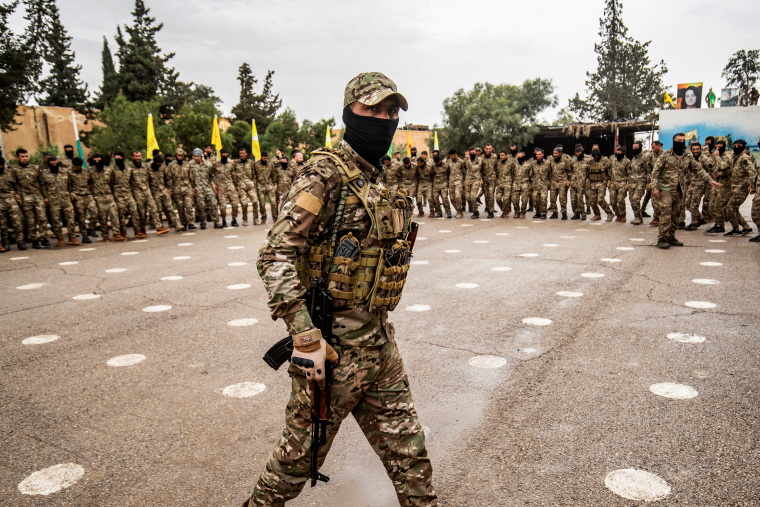
On 23 March 2021, Kurdish-led Syrian Democratic Forces marked the second anniversary of the Islamic State’s eviction with a military parade in the al-Omar oil field in Deir Ezzor governorate (Delil Souleiman)
Full of modifications
In 2012, the dominant Kurdish-led Democratic Union Party declared to form a “Western Kurdistan Council,” which evolved into the “Autonomous Administration” on 21 January 2014, and then the “Democratic Federalism of Rojava – Northern Syria” in 2015.
After that, the Democratic Union unilaterally announced, in 2016, changing the name to the “Federation of the North,” and after its geographical expansion, it was called the “Autonomous Administration of North and East Syria” in 2018.
This was accompanied by work to establish a “Social Contract” in the autonomous Administration, and on 6 January 2014, it was unilaterally ratified by the Democratic Union Party, according to an analytical report by the Fraternity Foundation for Human Rights.
On 13 December 2020, the autonomous and civil administrations in northeastern Syria delegated the presidency of the General Council of the “Self-Administration” to form a committee to reformulate the “Social Contract.”
The joint presidency announced the committee’s structure to reformulate the “Social Contract” on 10 June 2021.
On 15 July 2021, the committee met for the first time under the name of the “Constituent Committee” in the city of Hasakah and set its mission to re-draft the “charter,” consisting of all self-administration, civil, political forces, the women’s movement, and youth in northeastern Syria.
The recent reformulation of the “Social Contract” passed through several stages, according to what was reported by the Hawar agency. In the first stage, the time scope of the work of the mini-committee was determined, and it extended for five months from 15 July 2021.
As for the second phase, it ended after four sessions were held during December 2021, January, and February 2022, with an estimated interval of approximately 20 days between one session and another.
The second stage resulted in the agreement of the components in the first place and the unanimous approval of the participants on the final version of the reformulated “Contract.”
In the third stage, the reformulation of the “Charter” entered into the discussion of the expanded committee, the draft submitted by the small committee.
There is a final, unspecified stage, which came after the presentation and discussion of the “Charter,” and it will end with the final version attached to the opinions and proposals to the General Council of the “Self-Administration” for ratification.
Autonomous Administration motives to draft Charter
Subnational constitution-building processes often emphasize the difference between the de-facto authorities during the armed conflict from the central state and other de-facto authorities, as is the case in the Syrian file.
According to a research study issued by the International Institute for Democracy and Elections in 2021, the existence of subnational constitutions does not necessarily mean greater independence of certain de-facto authorities. The degree of independence from central state institutions depends largely on the size of the constitutional space granted to these authorities.
The constitutional space, in turn, is the extent given to subnational entities to define their goals, establish their own institutions and governance procedures and may sometimes be determined by peace agreements or transitional political arrangements, and the legal status of substate constitutional frameworks is subject to the central constitution of the state,” according to the study, titled “Substate Constitutions in Fragile and Conflict-affected Settings.”
These constitutions arise in fragile and conflict-affected countries, often as a result of a political settlement that includes guarantees of increasing the constitutional space and independence for the political entities that emerged during the armed conflict—the recurrence of the conflict or the emergence of new conflicts and their management by those components.
However, talking about the state’s general constitutional recognition of these sub-national constitutions may be considered premature in relation to the Syrian situation, which has not yet emerged from the stage of the non-international armed conflict, with the shrinking circle of military operations in most Syrian regions.
But the features of the idea of this type of constitution are clearly represented in the attempt of the “Self-Administration” to adopt a “constitution” specific to its areas of control and governance within its provisions.
What is a substate constitution?Substate constitutions are broadly understood as written legal instruments that limit and structure political power at the substate level with legal supremacy regarding other substate laws. Their primary goals are to define the specific governance system of the substate entity and often to codify citizen rights within its territory. They may also serve to delineate the political community and identity at the substate level. Substate entities, in turn, can be defined as territorially delineated constitutive parts of a country or state. Source: International Institute for Democracy and Electoral Assistance (IDEA) |
The Autonomous Administration considers this Charter as “a temporary constitutional document and not a constitutional declaration, as it is more detailed,” according to what the director of the Syrians for Truth and Justice organization, Bassam al-Ahmad, said in an interview with Enab Baladi.
According to al-Ahmad, the Autonomous Administration is trying to formulate the “Charter” to say that “the Syrian state has shrunk” in northeastern Syria, and “we are the peoples of this region, and they are Arabs, Kurds, Assyrians, Syriacs, Turkmen, and others, we need something temporary through which we can manage this region.” until certain political stability is reached for all of Syria.
“This matter is logical and justified,” according to al-Ahmad because such de-facto authorities are working to establish an activity of governance to support and monitor the work of civil institutions in their areas of control and to monitor the performance level of those in charge of them. “It may be a very failed governance and worse than the one before it. And sometimes there may be some notes on it,” according to al-Ahmad.
The local councils have played a major role in managing the areas that have fallen out of the regime’s control since their inception, which accompanied the start of the Syrian revolution in 2011.
These councils assumed responsibility for providing public services to the population in their areas, and they faced many problems and difficulties that threatened their existence and ability to continue.
And assessing the performance of governance in areas outside the regime’s control may be “subject to political affiliations,” according to human rights defender al-Ahmad.
Every societal component does not feel that it is part of the Syrian state, within the equal rights of the Syrian constitution issued in 2012, according to al-Ahmad, has the right to create their own constitution within the areas of armed conflict, as there is no constitutional danger from these practices.
The danger, according to al-Ahmad, lies in the continued existence of these constitutions after the end of the armed conflict and the establishment of entities that adopt constitutions as legitimacy for their existence.
The challenge that must be faced with regard to the creation of Syrian constitutional documents in the future is the fears of removing a certain societal component from the circle of discussions and public participation in the constitutional process, and the lack of respect for the rights of this component, its language, religion or culture, which may contribute to the formation of constitutions parallel to the Syrian constitution. In order for this component to obtain its full rights
Narrow political gains
The political interests in the Syrian file have become complicated and intertwined, especially in northeastern and northwestern Syria. While there are Turkish goals in the region, which they are eager to acquire in the absence of an effective American policy, the Russian position always tends to return to the desire to return all Syrian regions to the rule of the Syrian regime.
These matters hindered the participation of representatives from northeastern Syria in all international tracks related to the Syrian file, according to what a member of the “Social Contract” drafting committee said in an interview with Enab Baladi.
The member, who declined to be named because he does not have permission to speak with the media, added that the position of the Syrian opposition on the “Self-Administration” and the “SDC” is entirely in line with the Turkish position and is similar to the position of the regime government in dealing with the “SDF” as a separatist entity, and not one of the main forces in Syria, which was generated by the conditions of the armed conflict.
And “the existence of a constitution for the (self-administration), does not mean that it has isolated itself from Syria, or even from the war that has been going on for more than ten years,” according to what the member explained, considering the Administration’s constitution and all its data within the Syrian map and part of it and from this geography.
The Administration is looking for participation in drafting the Syrian constitution to establish its rights to self-administer the areas of northeastern Syria, which have suffered throughout the years of the Baath Party rule, since the seventies of the last century, from marginalization and the deterioration of basic services.
If the Autonomous Administration is invited to participate in the discussions of the Constitutional Committee in Geneva, it will not mind attending, according to what a member of the charter drafting committee told Enab Baladi.
The “Social Contract” that is being worked on is to “run the affairs of the region until a Syrian political solution is reached that guarantees the rights of all components of the Syrian people,” according to the member, who declined to be named because she did not have permission to speak with the media.
The member believes that if a Syrian political solution is reached, what is stated in the “Social Contract” will be the cornerstone of the future Syrian constitution, which will grant all Syrians all their rights that were taken by the Syrian regime.

The General Committee for Drafting the Social Contract Charter in Northeast Syria – 15 January 2021 (Health directorate of the Self-Administration of North and East Syria via Facebook)
Indirect recognition
The preamble to the Charter is an integral part of it, and it is manifested in rejecting the religious state, the nation-state, and the military as well, and it respects the sovereignty of the Syrian state and its geographical borders.
Bassam al-Ahmad, director of the Syrians for Truth and Justice organization, told Enab Baladi that there are very enormous political gains with the presence of a political party such as the Self-Administration, which is largely fought by the powerful Turkey which “has tools and groups inside Syria.”
The Kurdistan Workers Party, the ideological father of the PYD, is classified on terrorist lists in Turkey, the United States, the European Union, Iran, Australia, and a number of Arab countries.
Al-Ahmad believes that the Autonomous Administration has achieved gains compared to its size due to its cooperation with a significant number of the countries of the International Coalition and the American forces.
At the same time, the statements of the International Coalition and the US Department of Defense state that they do not intend to politically recognize the Autonomous Administration, although what is happening on the ground is a kind of political recognition in terms of visits and funding.
It is not in the perception of American policy that the SDF and the Autonomous Administration are one body, as both sides have different tasks from the other within different periods of time.
A report by the Pentagon in 2020 confirmed this perception because the majority of Arab tribes have negative views of the SDF and the civil institutions associated with it.
Because of these negative opinions, the US Department of Defense is working to reduce the role of the SDF in the region and direct them towards fighting against the “Islamic State,” which still maintains a “low level” of its operations inside the eastern region of Syria, and its ability to take defensive measures—limited in terms of scope, duration, and the number of fighters, according to the report.
This affects the “social contract” positively, as their dealings with the “administration” without recognizing its Charter lends it a layer of legitimacy without the direct intent of the “alliance” or America.
Al-Ahmad considers that the pretext of IS fighting is a political cover to consolidate its rule and control, and not to justify its violations, but within the executive governing bodies it can commit violations, as the Administration always tries to take care of its image, as is the case with the rest of the parties to the conflict in Syria.
Modifications as desired
Some members of the mini-committee say that they agree with fellow members on modifications, but after a while, they return to find that (the Administration) re-amends the terms as it wants,” according to al-Ahmad.
Many of the participants who work in re-modifying the Social Contract are exploited by using them only as a facade, which may indicate that the Administration is quite unwilling to change the social contract, according to al-Ahmad.
There is a clear exclusion of the Kurds in general and of the components of northeastern Syria, and of the Autonomous Administration in particular. The formula of the Constitutional Committee was an actual translation of this mindset, al-Ahmad added.
“Kidnapping Syrian geography”
Maan Talaa, a researcher at the Omran Center for Strategic Studies, believes that the attempt to codify the “de facto authority” imposed by the Democratic Union Party at the international level has not succeeded.
Despite the illegitimacy of the local Social Contract, it also did not contribute to the inclusion of Self-Administration among the local actors in the political process, nor did it push for the development of international relations for the Administration as a whole. The autonomous Administration remained in the framework of party individualism, and it is still roaming in the dialectics of international relations, where it was defined and treated as a substate actor, Talaa told Enab Baladi.
The Kurdish Democratic Union Party aspires to be among the main actors in the region, in which the “charter” contributes somewhere in making it a reality, and that is a powerful element that would be taken into account by the active countries in Syrian affairs.
However, the PYD’s view lacks objectivity as the absence of local civil and political life in northeastern Syria cannot be ignored, also, the influence of the PKK on decision-making centers cannot be ignored, Talaa said.
These facts make the whole notion of the “charter,” which derives its philosophical and intellectual system from Abdullah Öcalan’s beliefs, as “hijacking Syrian geography for the benefit of a network of partisan interests of the PKK and using it in its security and regional equations,” according to Talaa.
Thirst for power and ideology adaptation
Previous studies of the Omran Center talked about the drawbacks and problems of what was put forward in the “social contract” regarding federalism, which begins with the method of declaration from one side without this matter being the result of national discussions, and this proposition confuses between political decentralization and confederation.
Also, relying on geographical reality will not be a justification for transforming the de-facto authority into a codified authority within a new political system, according to Talaa.
The legal formulas indicate that the “administration” views itself as a fully sovereign state, which is a problematic legal lack of awareness on the one hand, and it has a political “imagination” of what the “administration” aspires to in a political settlement on the other hand, according to Talaa.
Under the Charter, the Autonomous Administration is granted full powers in distributing rights, including accepting the right of political asylum in Article 46, and the components are granted the right to self-determination in Article 22.
The Charter also re-divided the administrative borders, deeming them to be regions in Article 66 and granting each region the possibility of developing and consolidating diplomatic, economic, social, and cultural relations with neighboring peoples and countries.
In addition to articles from (54) to (84), which were refuted in the structure of government institutions, it is a consolidation of the idea of the party that leads the state and society, and this is a stark contrast to the slogans advocated by the Democratic Union Party, according to Talaa, and ultimately expresses its thirst for power and to subjugate ideology and slogans in order to do so.
Whether or not constitutions or laws of the de facto authorities in Syria exist in the future remain linked to an agreement on a constitutional document that does not violate the rights of Syrians, regardless of their political affiliation or national, social, and cultural background.
In order for a true constitutional reference to be established that represents all Syrians, draws a secure outline for their future, and guarantees the necessary ingredients for recovery from a decade of tragedy and violations, all obstacles that prevent this must first be removed, most notably the presence of a political system in Damascus that has rendered the country’s basic constitution its function of expression. On the rights of society and the identity of the state.
if you think the article contain wrong information or you have additional details Send Correction
النسخة العربية من المقال
-
Follow us :












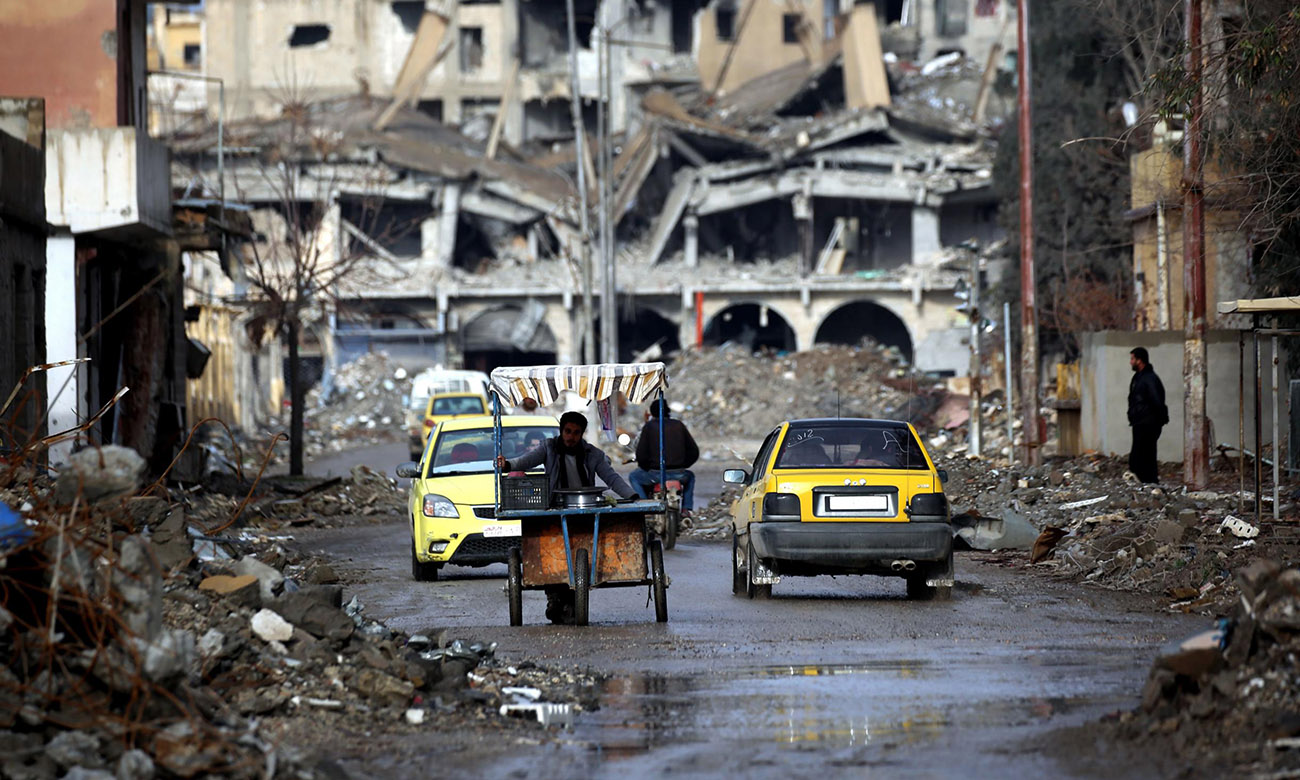
 People in the streets of Ain Issa town in the northeastern province of Raqqa - 24 November 2019 (AFP)
People in the streets of Ain Issa town in the northeastern province of Raqqa - 24 November 2019 (AFP)





 A
A
A
A
A
A
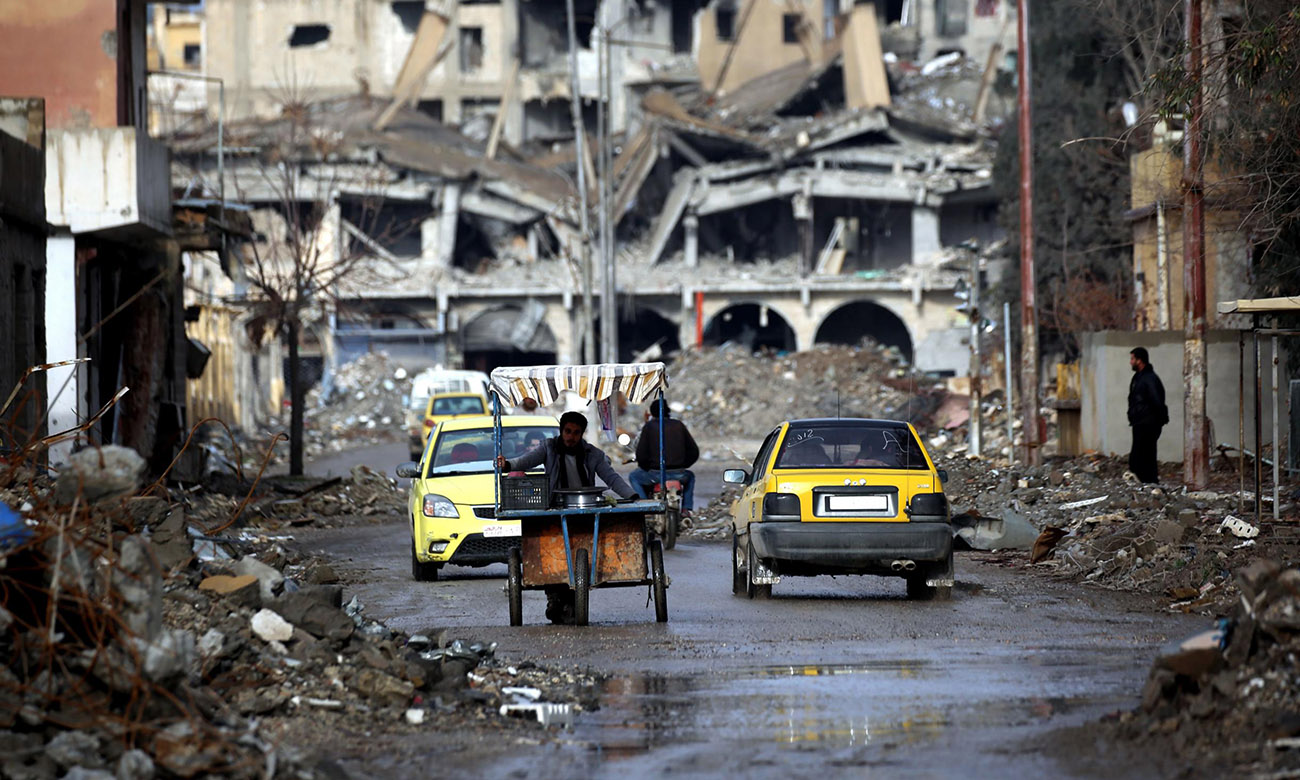


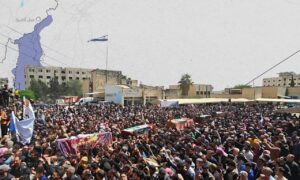




 More In-Depth
More In-Depth